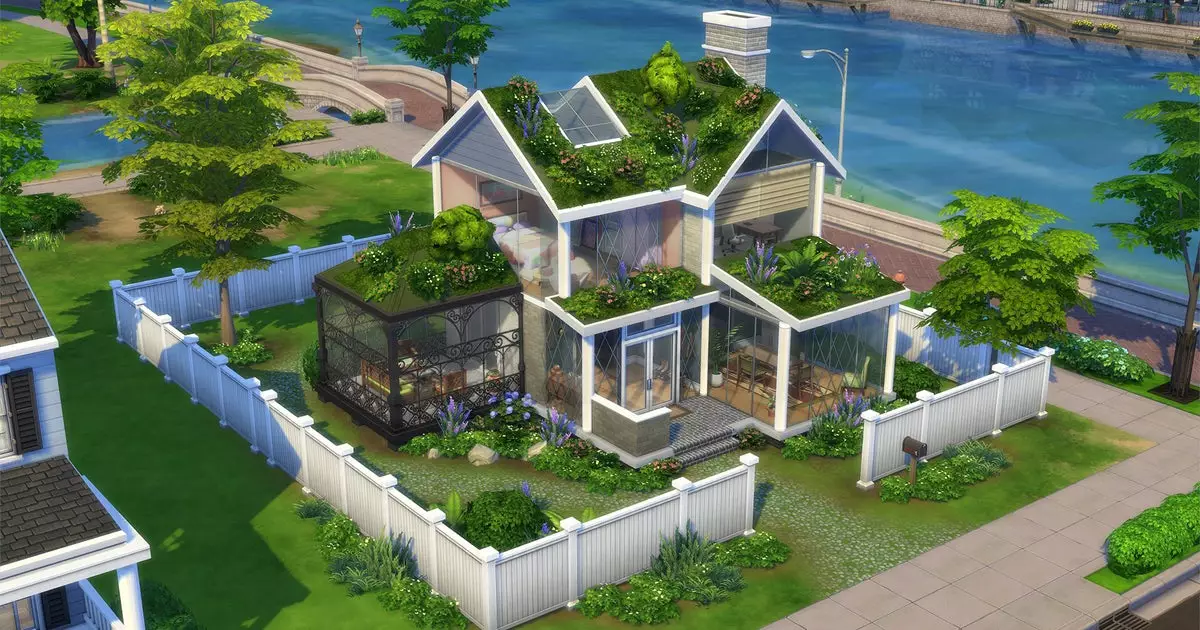The latest update to The Sims 4 reveals a disturbing trend: the pursuit of technological and creative expansion often comes at the expense of ethical considerations. While introducing features like glass walls and rooftop plants might seem innocuous or even charming on the surface, a deeper reflection exposes troubling implications. These additions, ostensibly designed to enhance gameplay and foster imaginative construction, inadvertently erode the fundamental sense of realism and moral responsibility that once distinguished the game. It’s a stark reminder that progress in digital spaces — much like in real life — requires a vigilant acknowledgment of its potential for misuse. When walls turn transparent, what boundaries do they dissolve? Is it merely a new aesthetic option, or a gateway to more sinister forms of virtual cruelty?
Transparency as a Double-Edged Sword
The very feature that allows players to craft glass walls and see through their creations also invites ethical pitfalls. Previously, hiding incommunicado behind opaque barriers provided a semblance of privacy—an essential ingredient in fiction and gameplay that mimics real-world morality. The switch to transparent walls doesn’t just open up visual space; it obliterates personal borders. When you can build “cozy” transparent prisons or cages, the game unwittingly empowers and perhaps normalizes the act of objectifying virtual people. It’s a subtle but insidious shift: design options that were once confined to aesthetics now risk becoming tools of cruelty. If the game fosters such options, what lessons—subconscious or otherwise—are players absorbing about boundaries, privacy, and respect? This blurring of lines isn’t just a game design issue; it’s a mirror held up to societal attitudes and the potential desensitization to mistreatment masked as creative expression.
Innovation Often Outpaces Ethics
The push for novelty in The Sims 4 appears driven by a desire to keep players engaged and to push creative limits. Yet, this relentless chase for the latest feature—like rooftop plant placements or see-through walls—raises questions about the ethic of development. Are these advancements truly serving players, or do they subtly encourage more exploitative behaviors? It’s revealing that players quickly took to repurposing transparent walls for imprisoning Sims, turning benign updates into instruments of virtual cruelty. Such behavior doesn’t emerge in a vacuum; it’s enabled by the very features touted as innovative. Developers must introspect whether their updates are fostering community and fun or simply providing new avenues for mischief and moral ambiguity. Progress that disregards potential harm risks undermining the moral fabric of digital gameplay, and by extension, real-world values.
The Danger of Normalizing Virtual Violence
The game’s evolution brings to light an unsettling trend: normalizing virtual cruelty under the guise of creative freedom. The adoption of features like glass walls and rooftop gardens may appear harmless to some, yet they subtly endorse notions of control and domination. When players utilize these features to construct prisons or observe “prisoners” through glass, they participate in a sanitized form of domination—one that can desensitize players from genuine empathy. If an environment as controlled and fantastical as The Sims becomes a sandbox for cruelty, how can we resist the drift toward desensitization in more consequential settings? The virtual realm often acts as a testing ground; what begins as harmless fun can evolve into a normalized acceptance of exploitative behavior, blurring the lines between morality and amusement.
Redefining Boundaries in Virtual Environments
What’s truly at stake here isn’t just the latest features in a popular game but the subconscious message about limits and ethics. The inclusion of transparent walls—but more broadly, the opacity of moral limits—suggests a disturbing tolerance for boundary-pushing. When features are added without question or critical reflection, they contribute to a culture where the distinction between right and wrong becomes increasingly murky. Developers must exercise responsibility and constraint, ensuring that creative freedom doesn’t morph into a pretext for dehumanization—virtual or real. As players, it’s imperative to recognize that the virtual sandbox isn’t just about aesthetic customization but about reinforcing or challenging our collective values and morals.
The evolution of The Sims 4 exemplifies how technological progress can serve as a double-edged sword—a tool for creativity or a catalyst for moral decline. The challenge lies in balancing innovation with integrity, ensuring that features designed to entertain do not subtly erode our sense of empathy and respect. Progress that neglects ethical reflection risks turning our virtual worlds into arenas of cruelty, diminishing the very humanity we seek to mirror and nurture. As we tinker with the boundaries of virtual reality, we must ask ourselves: are we building better worlds or just more deceptive facades?

